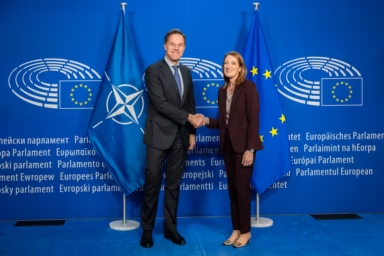The European Parliament will be drafting a major own-initiative report to tackle Europe’s deepening health workforce crisis, a move spurred by mounting political urgency and the distress signals coming from hospital corridors across the EU.
Led jointly by the Committee on Public Health (SANT) and the Committee on Employment and Social Affairs (EMPL), the report is expected to be finalised in early 2026. MEPs will resume work on it after the summer recess, with a key expert hearing planned for September.
The goal is clear: shape an EU-level response to one of the biggest structural threats facing Europe’s health systems.
As highlighted in the #DoctorsVoice campaign led by the Standing Committee of European Doctors (CPME), physicians across Europe describe themselves as “Burnt out, overworked, and thinking of leaving.”
You might be interested
The crisis is no longer a warning for the future, it is happening now. Across Europe, clinics are closing, rural hospitals can’t fill vacancies, and young doctors are abandoning the profession.
The campaign is amplifying frontline experiences. One doctor from Croatia described colleagues as “overworked, burnt out and considering leaving the profession, not because they lack passion, but because the healthcare system is failing them.”
In the Czech Republic, a physician reported working “hundreds of hours over legal limits,” with some doctors relying on illegal overtime to survive. A resident in Greece recalled eight years of 83-hour weeks. “These working circumstances affect our well-being and personal relationships. We need protection and respect,” she said.
Doctors from across the EU have echoed similar stories, from low pay in Greece to increased aggression from patients in the Netherlands and Slovenia. As Dr. Andreas Botzlar, CPME Vice President put it, “There is a disconnect between the realities of frontline care and the decisions of policymakers.”
My colleagues are overworked, burnt out and considering leaving the profession, not because they lack passion, but because the healthcare system is failing them. – Doctor from Croatia
A turning point: Parliament will respond with new report
In response, MEPs have launched a joint committee effort to develop a comprehensive strategy. The upcoming report, still in the draft phase, is being positioned as a blueprint for EU and national-level reforms.
“The whole healthcare sector is running on overtime,” MEP Li Andersson warned at the start of the initiative. The consequences, they said, range from deteriorating mental health to a loss of attractiveness of the profession, all feeding a vicious cycle that risks collapsing care systems altogether.
A formal exchange of views with the European Commission kicked off the drafting phase. That session reviewed current EU-funded programmes, such as the EU4Health Joint Action HEROES (focused on planning) and the BeWell project (focused on digital upskilling). But several MEPs questioned whether funding alone could address what has become a human capital crisis.
Commission outlines actions and warns money isn’t enough
The Commission confirmed that over €55 bn is already being invested in EU health systems, €43 billion from Recovery and Resilience Plans and €12.5 bn from Cohesion Funds. However, officials stressed that spending must be tied to strategic reform.
“We will not be a competitive economy if our population is not healthy,” said Katarzyna Ptak-Bufkens of DG SANTE. She called for a stronger link between EU funding and workforce-related reforms, especially through the European Semester.
One targeted initiative is focusing on nurse retention. Data is being collected from 20 Member States to understand why nurses are leaving and to shape responses, including mentoring, recruitment reforms, and better workplace protections. “They leave because they are scared of the workload,” Ptak-Bufkens explained, “because they don’t have support.”
While some national governments are moving ahead, the challenges differ widely. France has added a mandatory year of ambulatory care for general practice trainees. Lithuania has passed legislation to improve working conditions. Belgium adopted two laws to clearly define the scope and responsibilities of advanced practice nurses.
Still, the Commission warned against top-down blueprints. “We cannot address these problems in the same way in Romania and in the Netherlands,” said Ptak-Bufkens. “The strength is with Member States.”
Ten steps to change: WHO roadmap enters the discussion
Former Health Commissioner MEP Vytenis Andriukaitis, urged the committees to use the WHO roadmap as a foundation. He was part of the original team behind it and presented a 10-point plan, calling it “an urgent action strategy for all 27 Member States.”
The plan includes aligning education with population needs, expanding digital tools, supporting mental health, and creating better conditions for retention. “Otherwise,” he warned, “we are repeating and repeating the same data.” He also called on Parliament to push for Council adoption of concrete recommendations based on the roadmap.
We are repeating and repeating the same data. – MEP Vytenis Andriukaitis
Junior doctors and WHO: aligning for optimisation
At the same time, Europe’s younger generation of doctors is developing its own roadmap. The European Junior Doctors’ (EJD) Association recently adopted a Policy on Workforce Led Optimization of Healthcare Systems.
WHO/Europe welcomed the move as “a pivotal step,” and urged Member States to take note. Dr Cathal Morgan, Technical Officer at WHO/Europe, described the EJD framework as a “people-centred response to critical shortages and future system shocks.”
The EJD’s recommendations focus on optimising the skill mix and task distribution across health professions, aiming to reduce inefficiencies and variation in care. They also call for the wider use of digital tools to support healthcare delivery, especially in resource-constrained settings. Finally, the policy highlights the need to strengthen workforce data systems, enabling more accurate, evidence-based planning and deployment strategies.
“It all comes down to how well we use healthcare professionals’ valuable time,” said Dr Patrick Pihelgas, Chair of the EJD Medical Workforce Committee.
The next milestone comes in September, when the Parliament hosts an expert hearing to feed additional evidence into the report. MEPs aim to finalise the full text by early 2026. By then, doctors and patients alike will be looking for more than words.










